
From Lacking Biblical Teaching to Learning about Generosity: Iglesia Evangélica Peruana Santiago, Wycliffe Global Alliance, and GTP
January 28, 2021
From Working Alone to Serving Together: GenerousChurch, NABLA Initiative, and GTP
March 31, 2021Bigger than Gifts and Buildings
Did you know that the Holy Week teachings of Jesus, which are often described as “the Olivet Discourse,” were prompted by some disciples who were celebrating the magnificence of the temple buildings and their elaborate decor fueled by donations?
Ironically, this took place immediately after Jesus downplayed the gifts of rich people and celebrated the sacrifice of the widow. It appears that they did not have ears to hear his “truly” statement. See for yourself.
As Jesus looked up, he saw the rich putting their gifts into the temple treasury. He also saw a poor widow put in two very small copper coins. “Truly I tell you,” he said, “this poor widow has put in more than all the others. All these people gave their gifts out of their wealth; but she out of her poverty put in all she had to live on.” Some of his disciples were remarking about how the temple was adorned with beautiful stones and with gifts dedicated to God. But Jesus said, “As for what you see here, the time will come when not one stone will be left on another; every one of them will be thrown down.” (Luke 21:1-6)
Notice two things from the response of our Lord. They are fitting points for Christian workers to remember as we interface with givers and because want to be attentive to what He wants us to hear.
A Focus on What is Not Given
Disciples (that includes us) tend to look at the size of gifts; Jesus looks at what people don’t give.
Jesus only celebrates when people give sacrificially, when we hold back nothing from God. So, while the disciples were focused on how big gifts had paid for buildings with beautiful stones, there was something more captivating to Jesus: a widow who gave out of her poverty all she had to live on. This prompts us to make sure that we as Christian workers encourage sacrificial generous giving like the widow, when our temptation is to celebrate the size of gifts from rich people. How can we do this?
We must sow biblical truth in the lives of people. God’s Word is living and active; it transforms cautious contributors into generous givers. Practically speaking, we must encourage everyone to measure giving proportionately, as God supplies, so that the giving is acceptable to God (2 Corinthians 8:12). We do well also to show the impact of a wide range of gifts to send a clear message that sacrificial gifts of varying sizes are equally important. Lastly, let us urge people to hold back nothing like the widow. The examples of Barnabas next to Ananias and Sapphira also illustrate this (Acts 4:32-5:11).
A Fixation on the Eternal
Disciples often focus on earthly things like buildings; Jesus wants our gaze fixed on eternal matters.
Times would get hard. Jesus knew the lifespan of those buildings was short. Within a generation, they’d be gone. In response, He wanted them to focus on something bigger than the buildings. There was a bigger story unfolding. He wanted them to understand that the pathway to life would be marked by persecution and difficult times. The same is true today.
But why beckon people to think about eternal things?
He wanted them to stand fast and not be thrown down like those stones would soon be. So, His instructions for them relate well to us in turbulent times: be watchful and prayerful. This is the role of attentive disciples today. We remind people not to get comfortable here on earth because all we see will soon pass away.
Let It All Go
What if we hold nothing back from God and remain watchful and prayerful?
When we live in light of what Jesus says is true in Luke 21, two things happen. Firstly, by holding nothing back, Jesus sees our sacrificial giving, and our obedience entrusts our existence into His loving care. Secondly, when we remain watchful and prayerful, He promises that we escape both anxieties and troubles. That’s life-giving news in crazy times. Put it to practice in your life, and share it with all those you serve as a Christian worker.
––––
This article was originally posted on the Christian Leadership Alliance Blog on 31 March 2021.
Más Grande que Regalos y Templos
¿Sabías que las enseñanzas de Jesús durante la Semana Santa, las cuales a menudo son descritas como “El Discurso del Monte de los Olivos”, fueron impulsadas por algunos discípulos que celebraban el esplendor de las construcciones de los templos y su decoración elaborada gracias a las donaciones recibidas?
Irónicamente, esto pasó justo después de que Jesús minimizara las ofrendas de los ricos y celebrara el sacrificio de la viuda. Parece que ellos no tenían oídos para escuchar su declaración de “verdad”. Léelo tú mismo.
Jesús se detuvo a observar y vio a los ricos que echaban sus ofrendas en las alcancías del templo. También vio a una viuda pobre que echaba dos moneditas de poco valor. Les aseguro —dijo— que esta viuda pobre ha echado más que todos los demás. Todos ellos dieron sus ofrendas de lo que les sobraba; pero ella, de su pobreza, echó todo lo que tenía para su sustento. Algunos de sus discípulos comentaban acerca del templo, de cómo estaba adornado con hermosas piedras y con ofrendas dedicadas a Dios. Pero Jesús dijo: —En cuanto a todo esto que ven ustedes, llegará el día en que no quedará piedra sobre piedra; todo será derribado. (Lucas 21:1-6 NTV)
Presta atención a dos cosas de la respuesta de nuestro Señor. Son puntos importantes para los obreros cristianos para que recuerden que mientras interactuamos con los dadores y porque queremos estar atentos a lo que Él quiere que escuchemos.
Un enfoque en lo que no es dado
Los discípulos (incluyéndonos) tienden a ver el tamaño de las ofrendas; Jesús ve lo que la gente no da.
Jesús únicamente celebra cuando la gente da con sacrificio, cuando no retenemos nada de Dios. Así que, mientras que los discípulos se enfocaban en cómo grandes ofrendas habían pagado por templos con hermosas piedras, había algo más cautivante para Jesús: una viuda que en su pobreza dio todo lo que tenía para vivir. Esto nos impulsa a asegurar que como obreros cristianos fomentemos la ofrenda generosa sacrificial como la viuda, cuando nuestra tentación es celebrar el tamaño de las ofrendas de los ricos. ¿Cómo podemos hacer esto?
Debemos sembrar la verdad bíblica en la vida de las personas. La palabra de Dios es viva y activa; transforma a los contribuyentes cautelosos en dadores generosos. En términos prácticos, debemos animar a todos a que midan el dar de manera proporcional, a la medida que Dios suple, para que la ofrenda sea aceptable a Dios (2 Corintios 8:12). También hacemos bien en mostrar el impacto de un amplio rango de ofrendas para enviar un mensaje claro que las ofrendas sacrificiales varían en tamaño y que todas sonigual de importantes. Por último, alentemos a las personas a que no retengan nada como la viuda. Los ejemplos de Bernabé, Ananías y Safira también ilustran esto (Hechos 4:32-5:11).
Una fijación en lo eterno
Los discípulos a menudo se enfocan en las cosas terrenales, como los templos; Jesús quiere nuestra mirada fija en lo eterno.
Habrían tiempos difíciles. Jesús sabía que el tiempo de vida de esos templos era corto. Después de una generación, los templos ya no estarían más. En respuesta, Él quería que se enfocaran en algo más grande que los templos. Había una historia más grande desarrollándose. Quería que entendieran que el camino de la vida estaría marcado por persecución y tiempos difíciles. Lo mismo es cierto el día de hoy.
¿Pero por qué llamar a la gente a pensar en las cosas eternas?
Él quería que permanecieran firmes y no se derribaran como esas piedras pronto lo harían. Así que, Sus instrucciones para ellos se relacionan bien con nosotros en tiempos turbulentos: sé atento y ora. Este es el rol de discípulos atentos el día de hoy. Nosotros le recordamos a la gente que no se sienta cómoda aquí en la tierra porque todo lo que vemos pronto pasará.
Deja ir todo
¿Qué pasaría si no retenemos nada de Dios y permanecemos atentos y en oración?
Cuando vivimos en la luz que lo que Jesús dice que es verdad en Lucas 21, pasan dos cosas. Primero, cuando no retenemos nada, Jesús ve nuestro dar sacrificial. Segundo, cuando nos mantenemos atentos y en oración, Él promete que escaparemos de la ansiedad y de los problemas. Esas son noticias vivificantes en tiempos extraños. Ponlo en práctica en tu vida, y compártelo con todas las personas a las que les sirves como obrero cristiano.
––––
Este artículo fue publicado originalmente en el blog de Christian Leadership Alliance el 31 de marzo de 2021.




